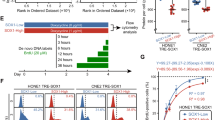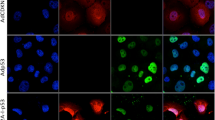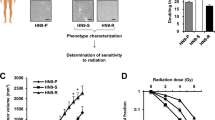Abstract
We have previously reported that a set of oral squamous cell carcinoma lines express specifically elevated cdk6 activity. One of the cell lines, SCC4, contains a cdk6 amplification and expresses functional p16ink4a, the other cell lines express undetectable levels of p16ink4a, despite a lack of coding-region mutations. Two of the cell lines, SCC15 and SCC40 have a hypermethylated p16ink4A promoter and a third cell line, SCC9, has a mutation in the p16ink4a promoter. Using the demethylation agent 5-aza-2′-deoxycytidine, we showed that the p16ink4a protein was re-expressed after a 5-day treatment with this chemical. One cell line, SCC15 expressed high levels of p16ink4a. In this line, cdk6 activity was decreased after 5-aza-2′deoxycytidine treatment, and the hypophosphorylated, growth suppressive form of the retinoblastoma tumor suppressor protein pRB was detected. Expression of p16ink4a persisted, even after the drug was removed and the cells expressed senescence-associated β-galactosidase activity. Ectopic expression of p16ink4a with a recombinant retrovirus in this cell line also induced a similar senescence-like phenotype. Hence, it was possible to restore a functional pRB pathway in an oral squamous cell carcinoma line by inducing re-expression of endogenous p16ink4a in response to treatment with a demethylating agent.
This is a preview of subscription content, access via your institution
Access options
Subscribe to this journal
Receive 50 print issues and online access
$259.00 per year
only $5.18 per issue
Buy this article
- Purchase on Springer Link
- Instant access to full article PDF
Prices may be subject to local taxes which are calculated during checkout
Similar content being viewed by others
Author information
Authors and Affiliations
Rights and permissions
About this article
Cite this article
Timmermann, S., Hinds, P. & Münger, K. Re-expression of endogenous p16ink4a in oral squamous cell carcinoma lines by 5-aza-2′-deoxycytidine treatment induces a senescence-like state. Oncogene 17, 3445–3453 (1998). https://doi.org/10.1038/sj.onc.1202244
Received:
Revised:
Accepted:
Published:
Issue Date:
DOI: https://doi.org/10.1038/sj.onc.1202244
Keywords
This article is cited by
-
Genomic insights into head and neck cancer
Cancers of the Head & Neck (2016)
-
Natural Compounds: DNA Methyltransferase Inhibitors in Oral Squamous Cell Carcinoma
Applied Biochemistry and Biotechnology (2015)
-
Folic acid supplementation increases survival and modulates high risk HPV-induced phenotypes in oral squamous cell carcinoma cells and correlates with p53 mRNA transcriptional down-regulation
Cancer Cell International (2012)
-
Transcriptional regulation of cellular senescence
Oncogene (2011)
-
Cytokine expression and signaling in drug-induced cellular senescence
Oncogene (2010)



